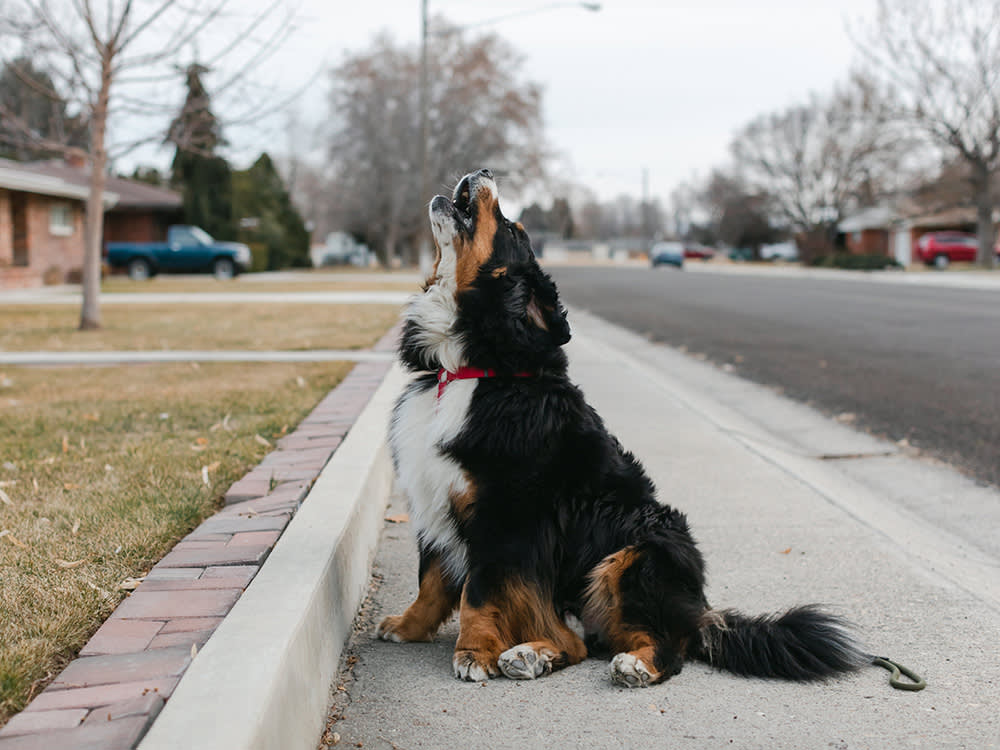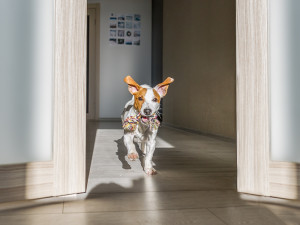We Answer the Age-Old Question: Why Do Dogs Howl?
How to help a howling dog turn down the volume (or even hit the off button).

Share Article
Sure, dogs bark and yelp — and make all sorts of adorable sounds, too (like the ruffs you hear when they’re asleep and clearly dreaming about playing with other pups). But a howl? That usually makes pet parents wonder: What’s going on? Are they scared or unhappy? And if it sounds particularly troublesome, how do we get them to stop?
Dog howling is a long, mournful sound very different from short, explosive barks and yelps or the high-pitched nasal whine. Howls are one of the hardest dog vocalizations to interpret, largely because there are many answers to the question, “Why does my dog howl?” The first thing to do is attempt to figure out the cause.
Why Do Dogs Howl?
Howling is a form of communication.
When dogs howl it serves as an alert. Dogs may howl to let you know that there is something they want you to notice. It could be a visitor, another sound, a lost toy, or anything else that has their attention. They may be excited, frightened, or frustrated by the situation (it’s tough to tell at first!).
For the record, some of this tendency has a genetic basis. Beagles are among the dog breeds that are likely to howl, as are scent hounds of many types, who are well known for both howling and baying. Huskies are famous for their song-like howls. Humans, however, are split on whether the sound is miserable or a joy to hear.
Howling can be an expression of pain, either physical or emotional.
Medical problems should always be explored as a possibility when a dog is howling, as physical pain can cause a dog to vocalize this way. Many dogs with separation anxiety will howl when left alone, conveying their deep emotional distress. Sometimes, the negative emotions — for example, boredom or annoyance — are less serious but still obviously unpleasant for the dog, resulting in the howling.
Dogs howl in response to loud and extended sounds.
Sirens, crying babies, and singing can all trigger howling in dogs, though perhaps the most contagious sound is the howling of another dog (or wolf or coyote — really, any canid will do). Experts speculate that whether the sound is another dog howl or just similar enough in some way to get them going, dogs are joining the chorusopens in new tab. Some dogs even howl at the tune of specific songs.
Dogs may howl as a cry for attention.
And of course, giving attention in response to the howl is likely to make the howls more frequent.
How to Stop Dog Howling
Dogs rarely outgrow howling, but those who do it frequently can be trained to do so much less often, and to cease the behavior when asked. With careful observation of the circumstances that precede the dog howling, you may be able to figure out what is triggering it. That will give you a good opportunity to short-circuit the trigger and prevent the howling.
I recommend identifying and addressing the root causes and working on interrupting the behavior when it does happen. After interrupting your dog, encourage them to stop by redirecting them to another activity, such as chewing, playing, or training. Train them to stop to a cue such as “Enough” by giving them a treat, toy, or chew toy when they stop howling after being asked to do so.
If you’re one of those humans who doesn’t mind the howling, however, let them go for it (as long as they’re not in any distress). And as long as it doesn’t make your neighbors want to howl at you.

Karen B. London, PhD, CAAB, CPDT-KA
Karen B. London, Ph.D., is a Certified Applied Animal Behaviorist and Certified Professional Dog Trainer who specializes in working with dogs with serious behavioral issues, including aggression, and has also trained other animals including cats, birds, snakes, and insects.
Related articles
![Dog barking]()
How to Stop Your Dog From Barking
The top five reasons dogs bark—and how to get them to relax a bit.
![Russian Toy Terrier with ears back]()
9 Reasons Why Dogs Put Their Ears Back
Here’s how your dog’s ears can clue you in to how they’re feeling.
![Jack Russell Terrier Puppy zooming around with a toy at home.]()
6 Things to Know About Dog Zoomies
Not counting how fun they are to watch.
![Sad boxer rests on owners lap, dog doesn't want to be touched]()
How to Tell if Your Dog Is in Pain
And what to do to help them.




